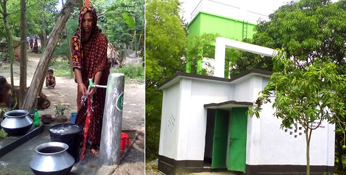RAJSHAHI, April 25, 2018 (BSS) – Around 13 lakh people are getting safe drinking water through pipelines in drought-hit Barind region.
The Barind Multipurpose Development Authority (BMDA) is now supplying the drinking water among people under a project titled ‘Drinking Piped Water Supply from Irrigation Deep Tube-wells’.
The BMDA has already installed various infrastructures, including overhead tanks and necessary distribution lines, to supply water to people who are suffering from acute water crisis, project director Engr Nazirul Islam told BSS.
The project is being implemented in 25 upazilas of Rajshahi, Naogaon and Chapainawabganj districts with a cost of around Taka 110.45 crore.
“The initiative was taken to reduce the acute crisis of drinking water in the drought-prone barind area,” Nazirul said.
In addition to extension of water supply installations, he said, necessary chemicals and equipment of water testing laboratory were arranged to make the water free from arsenic contamination and other toxic chemicals.
The BMDA has about 15,700 deep tube-wells. But, 1,550 tube-wells were brought under the drinking water supply project.
Nazrul Islam, a resident of Talukdharmapur village under Paba upazila, said there is a shortage of drinking water in the region during dry season and the problem has become acute for the last couple of years.
The existing shallow water technologies become ineffective currently and demand for deep tube-wells has increased in the area due to rapid decline of groundwater level along with arsenic contamination in shallow aquifer in many areas.
Engr Nazirul said the project has been taken to maintain round-the-year drinking water supply to the remote areas where the deep tube-wells used for irrigation remain functional.
Jahangir Alam Khan, assistant coordinator of the Integrated Water Resource Management Project of DASCOH Foundation, said villagers cannot withdraw groundwater through tube-wells as the water level goes down abnormally during dry season.
He said the excessive use of groundwater through irrigation and the existing adverse impact of climate change are putting local people in trouble since the hand-driven tube-wells are not functioning here in dry season.
The changed climatic condition has been posing a serious threat to the overall public health in the vast Barind tract, especially Tanore and Godagari upazilas in Rajshahi and Nachole and Gomostapur upazilas in Chapainawabgonj.
“The fight against water scarcity and unhygienic situation is very tough. Coordinated efforts of different government and non-government organisations are needed to address water problems here,” Jahangir said.



